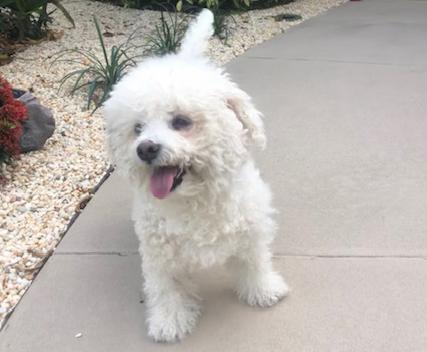-
About
- Leadership & Faculty
- News & Events
-
Academics
- Graduate
- Advanced Clinical Training
- Continuing Education
-
Student Life
-
Research
-
Hospitals & Clinics
- Emergency Care
- Hospital Services
-
Community Outreach
- Volunteer
“Miracle Dog” Ritchie Survives Complicated Surgery at Foster Hospital
Ritchie enjoys another 13 years with the Gaunya family after treatment of a rare cyst

Ritchie, a Bichon Frise, joined the Gaunya family when he was just eight weeks old. He was a healthy and active addition to the family of five.
“I always called him my Zen-like dog,” said Debbie Gaunya. “He was my emotional support animal, very calming and joyful.”
When Ritchie was two years old, his head began tilting to the right and he showed signs of vestibular ataxia, unsteadiness on his feet. A few days before Christmas, Ritchie’s head started bobbing conspicuously and he could not stand.
“I dropped my bags, grabbed him, and went tearing out of the house to Tufts,” said Ms. Gaunya. The family had lost another Bichon Frise to pneumonia just a few months earlier.
Ms. Gaunya met with Dr. Philip March at Foster Hospital for Small Animals at Tufts University. After an MRI, Dr. March observed an intracranial arachnoid diverticulum in the area of Ritchie’s brainstem and cerebellum, a cyst so rare he had seen it only twice before in his career. Dr. March prescribed prednisone to combat the swelling, and Ritchie quickly seemed back to normal. Dr. March also recommended surgery due to the tendency of these cysts to continue growing—and soon. He was concerned that eventually, Ritchie would weaken too much to survive the surgery, which would be risky regardless.
After the holidays, the Gaunyas scheduled the surgery with Dr. Dominik Faissler, a neurosurgeon at Foster Hospital and head of the neurology residency program at Cummings School for Veterinary Medicine at Tufts. While this type of cyst could not be removed entirely, Dr. Faissler performed marsupialization of the arachnoid diverticulum.
Dr. Faissler explained, “We cut a big window into the cyst so that the fluid can drain. To prevent the cyst from growing back, we sutured the opening to the surrounding tissue for the remaining cyst to stay open. This surgery was difficult because this cyst was located between the cerebellum and brainstem. This area is very sensitive to manipulation and trauma.”
Fortunately, the procedure was a success.
“We saw neurological improvement immediately after surgery,” said Dr. Faissler, noting that Ritchie was alert and eating well two days after the procedure.
When Ms. Gaunya arrived to bring Ritchie home, he pulled her out the front door of the hospital by his harness. “He had all this energy,” she said. “I knew at that moment that this dog would be okay.”
Ritchie had a mild head tilt afterward, but no longer showed signs of vestibular ataxia. At times he struggled with stairs but otherwise walked without issue.
Ritchie went on to live another 13 years. He enjoyed his time with the Gaunyas, going everywhere with the family—boating, golf cart rides, trips to Florida. When Ms. Gauyna gardened, he liked riding on top of the mulch in the wheelbarrow.
“I think the world of those doctors,” said Ms. Gaunya. “I’ve always been so grateful for those years with Ritchie. I know that I got 13 years that we wouldn’t have otherwise had if it weren’t for Tufts and that collaborative effort. We called him a miracle dog.”
Ritchie passed away from congestive heart failure earlier this fall, just shy of his fifteenth birthday.
“Ritchie survived a Pit bull attack, heart issues, lost hearing and vision, but he was happy to the very end,” said Ms. Gaunya. “They saved his life at Tufts.”
Department:
Foster Hospital for Small Animals